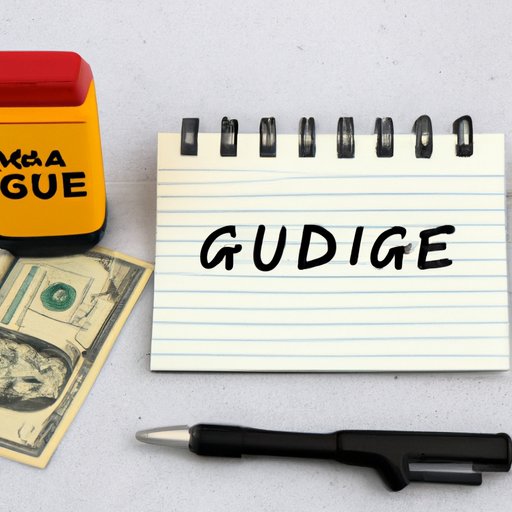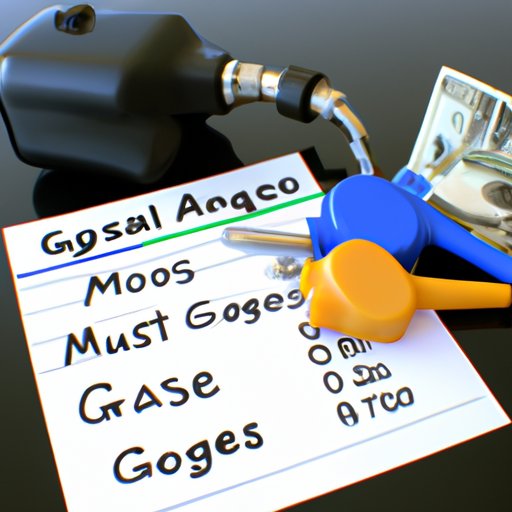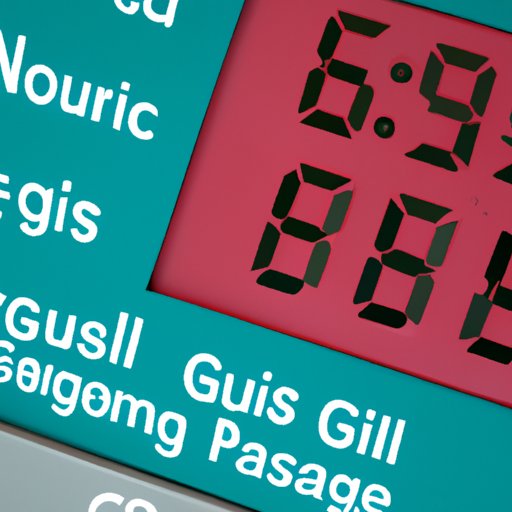Introduction
Taking a road trip is an exciting way to explore new places, but it can also be expensive if you don’t plan ahead. One of the biggest expenses associated with car trips is the cost of fuel. Fortunately, there are ways to estimate the amount of gas you’ll need for your journey and budget accordingly. This article will provide a step-by-step guide for calculating the cost of fuel for your next road trip and offer tips for maximizing fuel efficiency.
Calculating the Cost of Fuel for Your Trip: A Step-by-Step Guide
Estimating the cost of gas for a road trip requires some basic math. Here’s a step-by-step guide for calculating the total cost of fuel for your trip:
Step 1: Estimate the Distance You Will Travel
The first step in estimating the cost of fuel for your road trip is to estimate the distance you will travel. You can do this by looking at a map or using an online tool like Google Maps. Once you have an idea of the distance, you can use that number to calculate the amount of gas you’ll need for your trip.
Step 2: Determine the Average Fuel Economy of Your Vehicle
The next step is to determine the average fuel economy (MPG) of your vehicle. This number will vary depending on the type of vehicle you’re driving and how it’s been maintained. Your owner’s manual should have the estimated MPG for your vehicle, or you can look up the information online.
Step 3: Calculate the Total Cost of Fuel for Your Trip
Once you know the distance of your trip and the average MPG of your vehicle, you can calculate the total cost of fuel for your trip. To do this, simply divide the total distance of your trip by the MPG of your vehicle. The resulting number is the number of gallons of fuel you’ll need for your trip. Then, multiply that number by the current price of gas in your area to get the total cost of fuel for your trip.
How to Determine the Amount of Gas You’ll Need for a Road Trip
In addition to calculating the cost of fuel for your trip, it’s important to consider the amount of gas you’ll actually need for your journey. Here are a few things to keep in mind when determining the amount of gas you’ll need for your road trip:
Step 1: Calculate the Miles Per Gallon (MPG) of Your Vehicle
The first step is to calculate the miles per gallon (MPG) of your vehicle. This number will vary depending on the type of vehicle you’re driving and how it’s been maintained. Your owner’s manual should have the estimated MPG for your vehicle, or you can look it up online.
Step 2: Consider the Type of Driving You’ll Be Doing
Next, consider the type of driving you’ll be doing. If you’re traveling on highways and back roads, you’ll likely get better fuel economy than if you’re driving in stop-and-go city traffic. This will affect the amount of gas you’ll need for your trip.
Step 3: Calculate the Number of Gallons of Fuel You’ll Need
Once you know the MPG of your vehicle and the type of driving you’ll be doing, you can calculate the number of gallons of fuel you’ll need for your trip. To do this, simply divide the total distance of your trip by the MPG of your vehicle. The resulting number is the number of gallons of fuel you’ll need for your trip.

Budgeting for Gasoline: What You Need to Know Before Taking a Road Trip
In addition to calculating the amount of gas you’ll need for your trip, it’s important to budget for gasoline. Here are a few things to keep in mind when budgeting for fuel costs:
Step 1: Research the Average Price of Gas in Your Area
The first step is to research the average price of gas in your area. You can do this by checking online resources like GasBuddy or using a smartphone app like Waze. This will give you an idea of what to expect when it comes to the cost of fuel for your trip.
Step 2: Calculate the Total Cost of Fuel for Your Trip
Once you know the average price of gas in your area, you can calculate the total cost of fuel for your trip. To do this, simply multiply the number of gallons of fuel you’ll need for your trip by the average price of gas in your area.
Step 3: Compare Prices at Different Stations Along Your Route
Finally, it’s a good idea to compare prices at different stations along your route. Gas prices can vary significantly from one station to another, so you may be able to save money by filling up at a cheaper station. You can use apps like GasBuddy to find the cheapest gas near your destination.

Tips for Estimating the Cost of Gas for Your Next Vacation
There are also a few tips you can use to estimate the cost of gas for your next vacation. Here are a few things to keep in mind:
Look for Ways to Increase Your Vehicle’s MPG
One of the best ways to reduce the cost of fuel for your trip is to increase the MPG of your vehicle. Simple changes like keeping your tires properly inflated and avoiding aggressive acceleration can make a big difference in your vehicle’s fuel efficiency. You can also invest in aftermarket modifications like a cold air intake or a performance chip to further improve your vehicle’s MPG.
Take Advantage of Discounts and Coupons for Gasoline
Another great way to save money on fuel costs is to take advantage of discounts and coupons for gasoline. Many gas stations offer discounts for cash payments or loyalty programs that offer discounts for frequent customers. You can also search online for coupons for gas stations along your route.
Use Online Tools to Estimate the Cost of Fuel for Your Trip
Finally, there are a variety of online tools you can use to estimate the cost of fuel for your trip. Sites like GasBuddy offer detailed information about gas prices in different areas, as well as tools for calculating the total cost of fuel for your trip. These tools can be a great way to plan ahead and budget for fuel costs.
Maximizing Fuel Efficiency on Long Car Trips: Strategies for Saving Money
In addition to budgeting for fuel costs, there are a few strategies you can use to maximize fuel efficiency on long car trips. Here are a few tips to keep in mind:
Avoid Idling Your Vehicle When Possible
Idling your vehicle for long periods of time can significantly reduce your fuel efficiency. Whenever possible, try to turn off your engine when you’re stopped in traffic or at a red light. This will help you save money on fuel costs.
Drive at a Steady, Consistent Speed
Driving at a steady, consistent speed is one of the most effective ways to maximize fuel efficiency. Accelerating and decelerating too quickly can cause your vehicle to burn more fuel, so try to maintain a consistent speed whenever possible.
Use Cruise Control When Possible
Using cruise control is another great way to maximize fuel efficiency. Cruise control helps maintain a consistent speed, which can help you save money on fuel costs. Keep in mind that cruise control isn’t always suitable for all types of terrain, so use it only when it’s safe to do so.
Maintain Proper Tire Pressure
Lastly, maintaining proper tire pressure is essential for maximizing fuel efficiency. Low tire pressure can cause your vehicle to burn more fuel, so make sure to check your tire pressure regularly and inflate them to the manufacturer’s recommended level.
Conclusion
Planning ahead for fuel costs is essential for any road trip. By following the steps outlined in this article, you can easily calculate the cost of fuel for your next vacation. Additionally, you can use the tips and strategies provided to maximize fuel efficiency and save money on gas. With a bit of planning and preparation, you can ensure that your next road trip is both enjoyable and affordable.
(Note: Is this article not meeting your expectations? Do you have knowledge or insights to share? Unlock new opportunities and expand your reach by joining our authors team. Click Registration to join us and share your expertise with our readers.)
